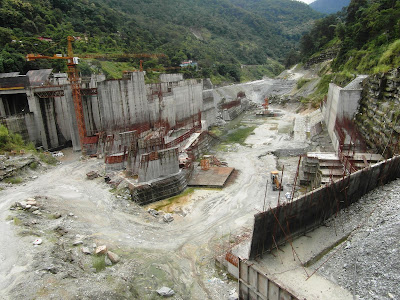This blog may help people explore some of the 'hidden' issues involved in certain media treatments of environmental and scientific issues. Using personal digital images, it's also intended to emphasise seasonal (and other) changes in natural history of the Swansea (South Wales) area. The material should help participants in field-based modules and people generally interested in the natural world. The views are wholly those of the author.
Sunday, 17 January 2021
Carbon Capture and Storage: Vital Technology or 'Greenwash'?
<
The idea of Carbon Capture and Storage (CCS) has been around some time. CCS can be used, in a variety of electrical power generating and industrial processes, to remove the generated carbon dioxide from effluent. The gases are passed through solvent tanks, before heat removes the carbon dioxide and the gas is stored. The solvent can be repeatedly recycled. The carbon dioxide can then be pumped underground (or, in the case of the UK, undersea in depleted North Sea oil sites?). The assumption is, that the gases will then be 'locked-in' for substantial periods and will not contribute to global heating. CCS has been repeatedly advocated, abandoned (as too costly) et cetera but the UK government is enthusiastic again and putting money into development (https://www.theguardian.com/environment/2021/jan/16/carbon-capture-vital-meeting-climate-goals-scientists-cut-emissions). A row, over CCS, is blowing up between environmentalists (who would like to see a move away from carbon dioxide-emitting processes) and some 'scientists' (broadly engineers and geologists, who think the technology is vital for 'heavy industry'). The CCS advocates argue that the UK will find it impossible to meet its carbon emissions commitments by 2030 and continue to produce steel and cement without the technology (well, they would say that wouldn't they?). There are some interesting trade-offs in this area. Cement production is a very major generator of the world's carbon dioxide. Production, involves heating limestone to very high temperatures. Carbon dioxide can thus be generated both by the heating process and by being driven off the limestone. So, if you want to 'go green', by using dam construction to generate hydroelectric power, you have to factor in any carbon dioxide production generated by the cement and steel used in the dams. Going 'green' by using wind power, also involves the use of massive quantities of steel in constructing the turbines. This means it can take some time, before your 'green' electricity (however generated), really reduces carbon dioxide emissions. Remember also that CCS requires the input of heat (generated how?) to separate the gas from the solvent. These are not easy calculations to make. I personally feel we should dispense with heavy industry, where we can do so (e.g. by using photovoltaic systems?). Where we have to use processes emitting lots of carbon dioxide, CCS should be mandatory. CCS should not, however, be used to prop up old processes that ought to have been 'retired'. I would also like stronger assurance, that the carbon dioxide captured by CCS will remain where we put it! I worry about such issues.
Subscribe to:
Post Comments (Atom)
-
I n the UK and US, a pparently popular and successful vegan/vegetarian restaurants are reportedly closing or adding meat to their menus ( ...
-
Early ripening fruit may seem convenient but some folk think it confirms environmental stress. There's also a possibility th...


%20mating%20NWCW.jpg)


No comments:
Post a Comment